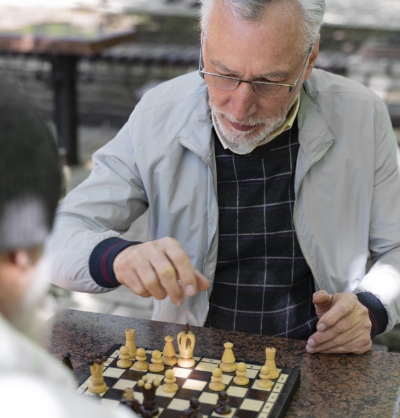Healthy choices
How can prostate cancer and treatment affect your brain?
Cognitive Health
Your cognitive health is your capacity to think clearly, carry out complex tasks, learn and remember
We’ve all experienced the signs of ‘brain fog’. Some men who undergo androgen deprivation therapy (ADT) can see these cognitive symptoms become more regular.1 ADT has also been linked to a (marginal) increase in the risk for Alzheimer’s Disease and dementia2 – although the long-term benefits are generally considered to outweigh this risk. In addition, the cognitive side effects of ADT are only apparent in some men. Many people do not experience any changes at all.
Emotional Health
A key pillar of your overall mental health, emotional health is all about your thoughts, mood and ability to cope
Learning you have prostate cancer and living positively with the reality of that diagnosis can be difficult. You might experience a whole range of emotions, including shock, uncertainty, anxiety, numbness and anger. It’s natural to feel this way, but over time these emotions can have a negative impact on your mental health and wellbeing. Someone living with prostate cancer is unfortunately more likely to experience depression than someone who isn’t3 – even more so if you’re undergoing ADT4. Prioritizing your mental health is therefore just as important as your physical wellbeing.

Did you know?
What’s good for your heart is good for your brain. Cardiovascular health is intimately linked with cognitive health,5-7 so activities which benefit your heart (like exercise and healthy eating), are a win-win.
Take action
Exercise your brain
The best way to protect your cognitive and emotional health is to keep your brain active. Any activities that engage your brain can help prevent cognitive decline during ADT. To keep your brain in peak shape, why not try:
- Catching up with friends or attending a social group – social activity is a great form of mental stimulation8
- Activities such as crafts, puzzles, computer use and playing games, which are all great ways to keep your mind moving 1
- Improving both your cardiovascular health and brain health by incorporating physical activity into your daily routine 9-11 and nourishing yourself with a Mediterranean diet 12,13


Information you can trust
With so many opinions out there, it can be hard to know who to follow. At Oncolifestyle we do our best to provide you with evidence-based information that has been carefully researched with your health in mind.
Our sources
Where is this information coming from?
Our sources
Where is this information coming from
- Cherrier, M. M. & Higano, C. S. Impact of androgen deprivation therapy on mood, cognition, and risk for AD. Urol. Oncol. Semin. Orig. Investig. 38, 53–61 (2020).
- Jayadevappa, R. et al. Association Between Androgen Deprivation Therapy Use and Diagnosis of Dementia in Men With Prostate Cancer. JAMA Netw. Open 2, e196562 (2019).
- Fervaha, G. et al. Psychological morbidity associated with prostate cancer: Rates and predictors of depression in the RADICAL PC study. Can. Urol. Assoc. J. 15, (2020).
- Dinh, K. T. et al. Association of Androgen Deprivation Therapy With Depression in Localized Prostate Cancer. J. Clin. Oncol. 34, 1905–1912 (2016).
- Chang, Y. K., Labban, J. D., Gapin, J. I. & Etnier, J. L. The effects of acute exercise on cognitive performance: A meta-analysis. Brain Res. 1453, 87–101 (2012).
- Northey, J. M., Cherbuin, N., Pumpa, K. L., Smee, D. J. & Rattray, B. Exercise interventions for cognitive function in adults older than 50: a systematic review with meta-analysis. Br. J. Sports Med. 52, 154–160 (2018).
- Fondell, E. et al. Physical activity across adulthood and subjective cognitive function in older men. Eur. J. Epidemiol. 33, 79–87 (2018).
- Elwood, P. et al. Healthy Lifestyles Reduce the Incidence of Chronic Diseases and Dementia: Evidence from the Caerphilly Cohort Study. PLoS ONE 8, e81877 (2013).
- Chang, Y. K., Labban, J. D., Gapin, J. I. & Etnier, J. L. The effects of acute exercise on cognitive performance: A meta-analysis. Brain Res. 1453, 87–101 (2012).
- Northey, J. M., Cherbuin, N., Pumpa, K. L., Smee, D. J. & Rattray, B. Exercise interventions for cognitive function in adults older than 50: a systematic review with meta-analysis. Br. J. Sports Med. 52, 154–160 (2018).
- Fondell, E. et al. Physical activity across adulthood and subjective cognitive function in older men. Eur. J. Epidemiol. 33, 79–87 (2018).
- Klímová, B. & Vališ, M. Nutritional Interventions as Beneficial Strategies to Delay Cognitive Decline in Healthy Older Individuals. Nutrients 10, 905 (2018).
- Anastasiou, C. et al. Mediterranean Lifestyle in Relation to Cognitive Health: Results from the HELIAD Study. Nutrients 10, 1557 (2018).

